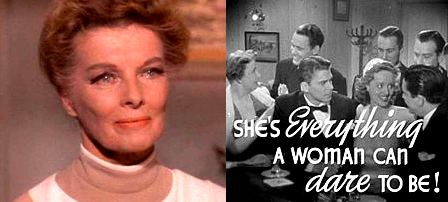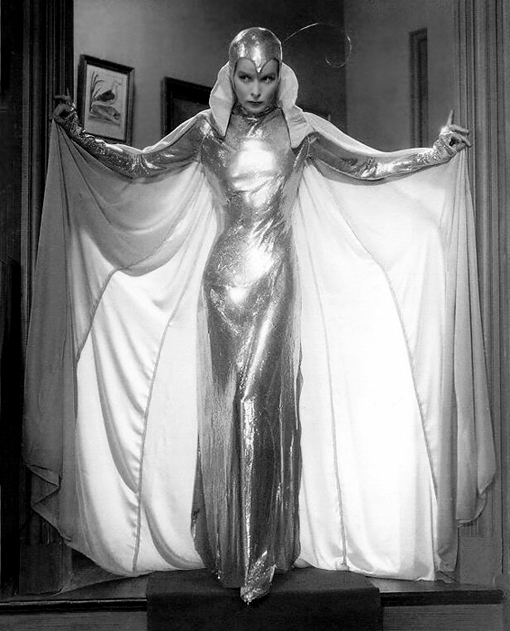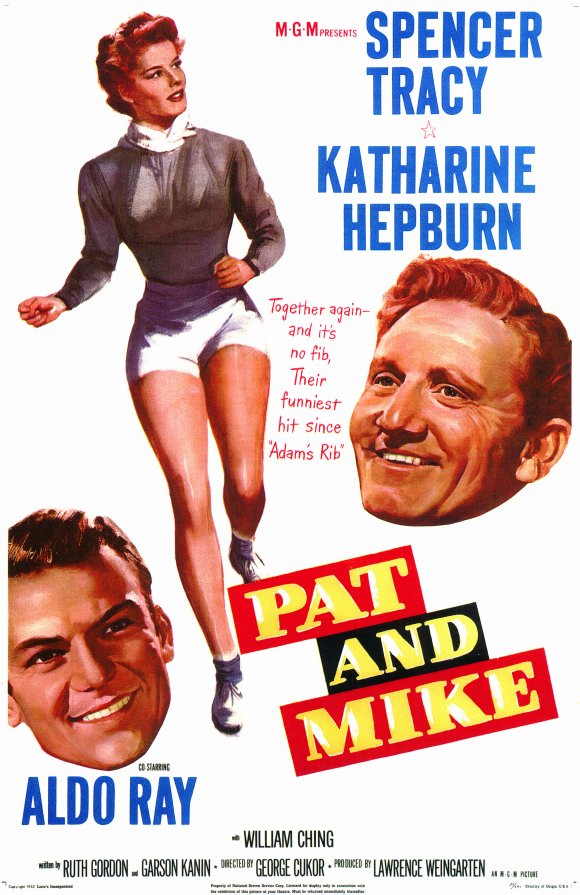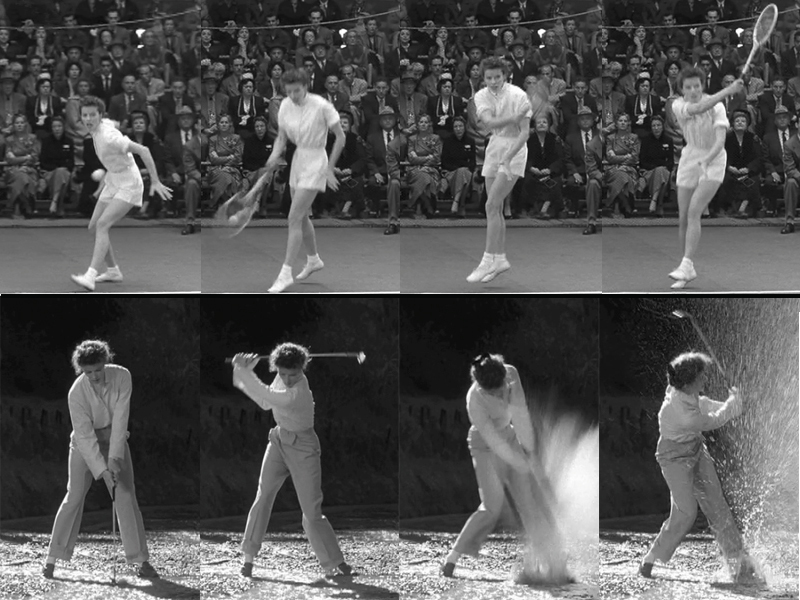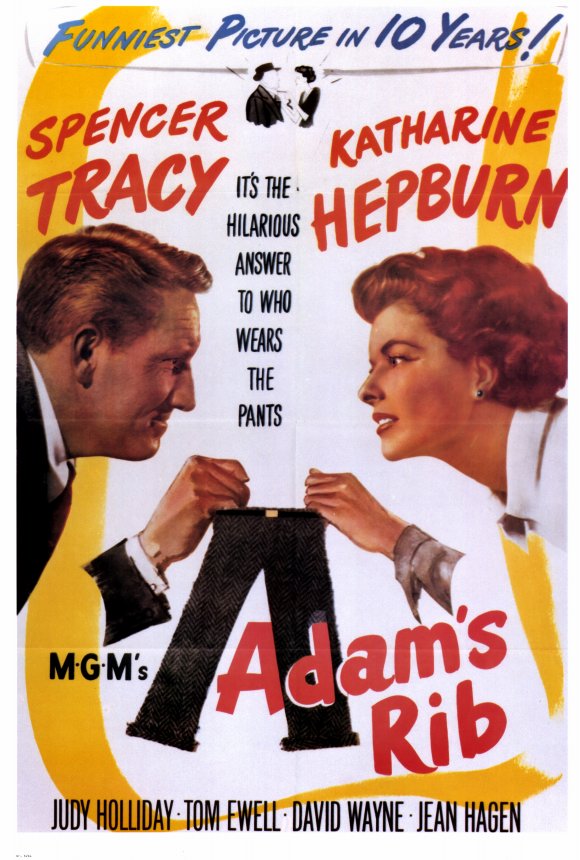Episode 25 of 52: In which Kate confronts Angela Lansbury onscreen and the Blacklist offscreen and manages to beat both.
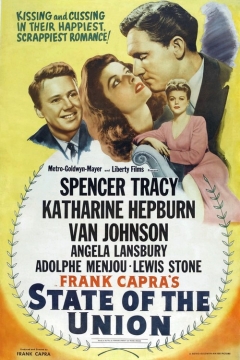 Early on, I stated that sometimes Kate’s career seems charmed. I’d venture 1948 is one of those charmed years. As we saw last week, Song of Love failed--Kate’s first failure at MGM. Yet some strange circumstances and good luck landed Kate in State of the Union, based on a Pulitzer Prize-winning play. I say “good luck” because in the fall of 1947, the storm that would become the Hollywood Blacklist was brewing, and Kate nearly got caught in the center of it.
Early on, I stated that sometimes Kate’s career seems charmed. I’d venture 1948 is one of those charmed years. As we saw last week, Song of Love failed--Kate’s first failure at MGM. Yet some strange circumstances and good luck landed Kate in State of the Union, based on a Pulitzer Prize-winning play. I say “good luck” because in the fall of 1947, the storm that would become the Hollywood Blacklist was brewing, and Kate nearly got caught in the center of it.
Though not as cloyingly obvious as Mr. Smith Goes to Washington - no light from the Lincoln Memorial in this film - State of the Union nevertheless delivers the classic Capra Corn package: nostalgia, patriotism, and a happy ending snatched from the jaws of tragedy at the last second. Spencer Tracy plays Grant Matthews, a self-made businessman who abandons his political and marital morals in order to run for president. Matthews is Mr. Smith if he’d met a lobbyist on his way to Washington: an idealist and a patriot, but also an egotist with political aspirations. In a word: corruptible.
Despite this refreshingly layered central character (played with well balanced self-awareness by Spencer Tracy), Capra fills the rest of the cast with his favorite stereotypes: the amoral politician (Adolphe Menjou), the conniving vamp (Angela Lansbury), the wise-cracking journalist (Van Johnson in top form), and most importantly the long-suffering matron, in this case Matthews’s wife, Mary (our own Kate). When Mary arrives (30 minutes in) she acts as Grant’s conscience, arguing loudly for him to practice honesty over chicanery. Kate shines in the comedy but can’t deliver the patronizing Capra monologues well--they come off as shrill and rushed. Unfortunately, she’s one shrill voice among many: the agriculture lobbyist, the labor lobbyist, the judge, the newspaper syndicate owner, etc. The theme of Capra’s State of the Union seems to be, “Every time a cash register rings, a lobbyist gets his wings.” That is, until a True American Patriot can stand up to the corruption.
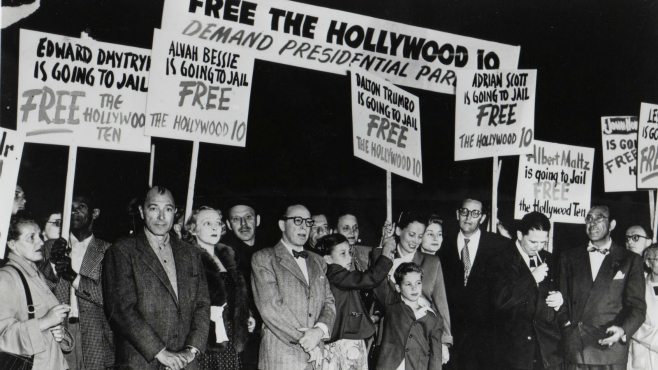 Protesting HUAC
Protesting HUAC
The idea of a righteous man standing up to a corrupt oppressor is part of the American identity, but it was also what so many of the actors, directors, and writers who were blacklisted in the 1940s and 1950s had attempted to do. When the Hollywood Ten stood in front of the House Committee on Un-American Activities (HUAC) in Fall of 1947 and refused to testify about their political beliefs, they were not only criminally charged, but also shunned by the terrified studios. Among those Kate worked with who would face HUAC and the blacklist were Ring Lardner Jr. (Oscar-winning writer of Woman of the Year), Donald Ogden Stiers (The Philadelphia Story and Without Love), and Dalton Trumbo.
Kate herself would face her biggest backlash that fall. In the November 1947, just days before the Hollywood Ten and the Waldorf Statement, Kate’s name was popping up with alarming regularity as a possible Commie next to names like Charlie Chaplin and Paul Robeson. Always one to stand by her convictions, Kate had made an unpopular political speech in May (wearing a red dress), and now insisted on joining the Committee for the First Amendment to protest HUAC. By the time Song of Love opened, Hedda Hopper was gleefully reporting that Kate’s image on movie screens was being stoned by patriotic patrons. Fortunately, Kate was already shooting State of the Union, a movie where she declares twice that she is a Republican, and stands--however woodenly--as the nationalistic moral conscience of a film made by a decorated hero.
This is what I mean by luck. HUAC didn’t go after A-List stars (too risky), but if Kate had starred in a few more flops, or if Claudette Colbert hadn’t gotten sick and had to drop out of State of the Union, or if Kate socked Adolphe Menjou on set for being a Friendly Witness to HUAC instead of being WASP-y and polite, Hepburn may not have stepped into Capra’s flagwaving film in October 1947. As it was, State of the Union was a success when it opened in 1948. Kate was (at least affiliated with) a patriot, so she stayed an A-List celebrity, and the Communist rumors slowly faded. It was like getting a seal of approval from a bald eagle. It’s a pity though. I’d have loved to see Kate smack Adolphe Menjou.

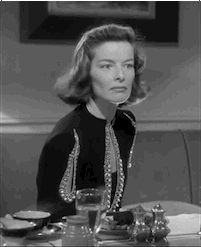 Previous Weeks: A Bill of Divorcement, Christopher Strong, Morning Glory, Little Women, Spitfire, The Little Minister, Break of Hearts, Alice Adams, Sylvia Scarlett, Mary of Scotland, A Woman Rebels, Quality Street, Stage Door, Bringing Up Baby, Holiday,The Philadelphia Story, Woman of the Year, Keeper Of The Flame, Stage Door Canteen,Dragon Seed, Without Love, Undercurrent, The Sea Of Grass, Song of Love
Previous Weeks: A Bill of Divorcement, Christopher Strong, Morning Glory, Little Women, Spitfire, The Little Minister, Break of Hearts, Alice Adams, Sylvia Scarlett, Mary of Scotland, A Woman Rebels, Quality Street, Stage Door, Bringing Up Baby, Holiday,The Philadelphia Story, Woman of the Year, Keeper Of The Flame, Stage Door Canteen,Dragon Seed, Without Love, Undercurrent, The Sea Of Grass, Song of Love
Next Week: Adam's Rib (1949) - In which Tracy and Hepburn's best comedy shows that love, life, and law are a circus.
 Monday, July 14, 2014 at 2:25PM
Monday, July 14, 2014 at 2:25PM 